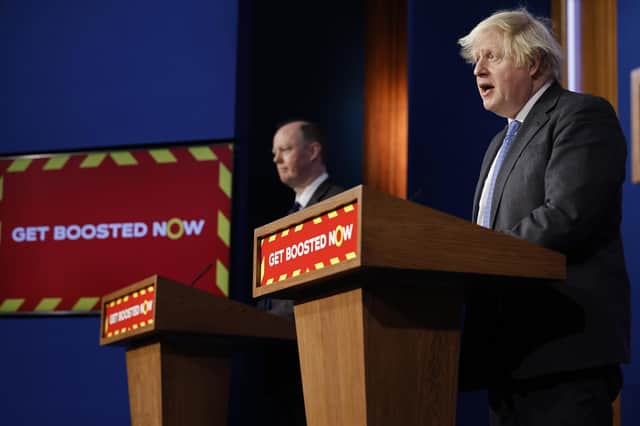Boris Johnson's scientific advisers warn delays on new Covid rules will lead to longer restrictions


Minutes from a meeting of the Scientific Advisory Group for Emergencies (SAGE) on Monday were published today and reveal they highlighted how earlier interventions would have a greater effect, as well as warning that hospitalisations could reach the previous peaks seen during the pandemic “in the absence of further interventions or significant behaviour change” unless the new strain is 90 per cent less severe than the Delta variant.
The minutes were released hours before the UK Health Security Agency reported people with Omicron are up to 70 per cent less likely to be admitted to hospital. The SAGE meeting, which was attended by England’s chief medical officer Professor Chris Whitty and Chief Scientific Adviser Patrick Vallance, took place ahead of a Cabinet meeting on Tuesday that ultimately resulted in no new measures being agreed.
Advertisement
Hide AdAdvertisement
Hide AdThe Government does not intend to make any new announcements on post-Christmas measures for England this week despite Scotland, Wales and Northern Ireland already laying out their plans for extra restrictions such as banning spectators from sports events and returning to the rule of six in pubs and restaurants.
The SAGE minutes said: “It continues to be the case that the earlier interventions happen the greater the effect they will have. Even a short intervention could reduce both peak and total admissions, particularly if introduced early enough.
"The main benefit of a short intervention would be in flattening the peak of admissions, and to allow more people to receive boosters. If measures are implemented later, when hospital admissions have risen significantly, measures may need to be in place for longer and may be too late to avert a period with very high admissions.”
The minutes also states: “There remain several important uncertainties in the parameters used for modelling, including biological parameters for Omicron as well as behavioural changes. Policy decisions (either to do nothing or something) will need to be made sooner than these uncertainties can be resolved. There is already evidence of behavioural change over the past week with increased mask wearing, reduced social mixing (although this varies across age groups) and a change in testing patterns.
Advertisement
Hide AdAdvertisement
Hide Ad“It is possible that the infection hospitalisation rate could rise even if Omicron is intrinsically less severe than Delta if vaccine escape means a higher proportion of those infected are in older age groups.
"A large wave of hospitalisations would be likely to follow a large wave of infections, even if there were a reduction in intrinsic severity. In the absence of further interventions or significant behaviour change, intrinsic severity would need to be greatly reduced (by around 90%) for hospitalisations to not reach the levels of previous peaks unless the wave peaks early for other reasons, which should not be assumed for planning purposes."
It came as the UK experienced yet another record-breaking number of daily reported Covid cases, with 119,789 reported as of 9am on Thursday. A further 147 people have died, while 840,000 booster jabs and third doses were given on Wednesday.
The results of the UKHSA research are consistent with that of two other early studies into Omicron by Imperial College London and the University of Edinburgh.
Advertisement
Hide AdAdvertisement
Hide AdSpeaking prior to the release of the UKHSA findings, Professor Andrew Heywood, a member of the government’s emerging virus committee Nervtag, told the BBC the early information on Omicron’s severity was “undeniably good news”. He added: “I think perhaps we can downgrade this from a hurricane to a very severe storm.”
Health Secretary Sajid Javid said: “This new UKHSA data on Omicron is promising – while two doses of the vaccine aren’t enough, we know boosters offer significant protection against the variant and early evidence suggests this strain may be less severe than Delta.
“However, cases of the variant continue to rise at an extraordinary rate – already surpassing the record daily number in the pandemic. Hospital admissions are increasing, and we cannot risk the NHS being overwhelmed.
“This is early-stage analysis and we continue to monitor the data hour by hour. It is still too early to determine next steps, so please stay cautious this Christmas and get your booster as soon as possible to protect yourself and your loved ones.”
Advertisement
Hide AdAdvertisement
Hide AdShadow culture secretary Lucy Powell said Boris Johnson has been unable to take decisions on Covid data because he has “lost authority with the public”.
Calling for more clarity from the Government on its Covid strategy, the Labour politician told Sky News there is a “feeling” that “the Prime Minister is not actually able to take those decisions based very clearly on data because he’s got his own political problems, and he’s lost authority with the public in order to convey some of those messages”.
She added: “The Government must be working to something. Why can’t we all know what that is, and have a clearer sense about what would happen when if some of those data points changed, and what wouldn’t happen when if some of those data points became more positive?”
Support The Yorkshire Post and become a subscriber today. Your subscription will help us to continue to bring quality news to the people of Yorkshire. In return, you'll see fewer ads on site, get free access to our app and receive exclusive members-only offers. Click here to subscribe.